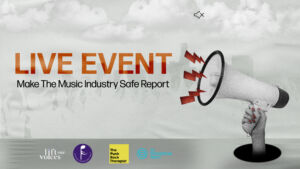
Make The Music Industry Safe Project
Recently, a coalition of four women-led non-profits will launch a multi-month, aggressive advocacy campaign to hold the music industry accountable for sexual violence. The first stage of this coordinated campaign was the release of a report detailing the sexual abuse of women by artists, executives, and other prominent figures in the music industry. This comprehensive report chronicles the scathing history of seven decades of sexual abuse and coverup, from the 1950s to the present.
Five Demands:
- No More NDAs That Silence Survivors: Non-disclosure agreements (NDAs) are often used to manipulate and silence survivors. Furthermore, survivors are not always given an opportunity to fully read the NDA or consult with an attorney before signing. This practice needs to stop.
- Mandated Protocols. If You See Something, Say Something: People in positions of power in the music industry should be required to report allegations of sexual assault, misconduct, or any covering up of these crimes. Corporate protocols and training must be implemented to ensure follow-through.
- Independent Organization – Make Music Safe Division: Investigations into allegations of sexual assault or misconduct must be completed by an unbiased, outside party to ensure accuracy, integrity, and safety are prioritized.
- Publication of Celebrities & Executives Credibly Accused of Sexual Assault and Harassment: A list of credibly accused musicians, executives, managers, producers and other professionals at Warner Music Group must be released to the public. The public and survivors deserve transparency and honesty.
- Victim/Survivor Legislation: According to multiple studies, we know it often takes survivors years or decades to feel safe enough to disclose abuse. Trauma typically impacts a survivor for their entire life, so why is there a time limit for them to take legal action? Survivors should not be held back by legal timelines that make seeking justice more challenging or even worse, impossible. The music industry should support survivor-centric legislation that gives survivors more time to come forward.
The Representation Project: The Representation Project (TRP) is the leading gender watchdog organization. Using film and media as catalysts for cultural transformation, TRP inspires individuals and communities to challenge limiting gender stereotypes and shift norms. Jennifer Siebel Newsom founded the organization in 2011 in response to the overwhelming public demand for ongoing education and social action in support of her first film, Miss Representation.
Lift Our Voices: The mission of Lift Our Voices (LOV) is simple: to transform the American workplace, making it safer and more equitable for everyone. By organizing communities to change laws and policies, advocating for survivors, and promoting awareness for a safer and more inclusive workplace environment, we are rewriting the rules to ensure every worker has a voice.
The Punk Rock Therapist: The Punk Rock Therapist is a grassroots group of women who have dedicated their time, resources, hearts, and souls to supporting survivors of sexual assault in the music industry by providing free therapy sessions with a therapist who has walked the same path: from victim to survivor to thriver.
Female Composer Safety League: The Female Composer Safety League (FCSL) was conceived in 2018 and was launched shortly after. Its mission to advocate for the safety and inclusion of women composers serves a vital need in the male-dominated fields of film music, television music, concert music, video game music, and commercial composing.
This report is gathered from public information and detailed instances of reported sexual abuse, harassment, and related misconduct within the music industry carried out by artists, executives, managers, producers, and other prominent players. While there are lawsuits identifying some of these alleged perpetrators, many of these allegations have not been fully evaluated in a civil court. Accordingly, the allegations should be considered just allegations and should not be considered proven or substantiated in a court of law. All individuals should be considered innocent until proven guilty.
